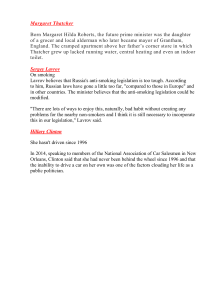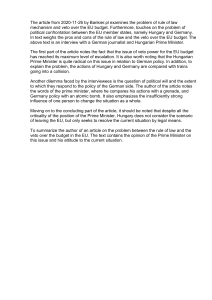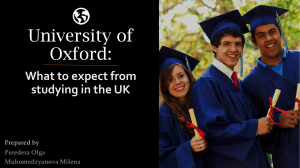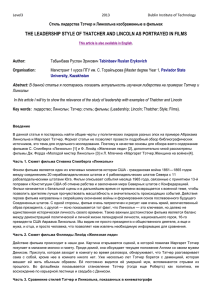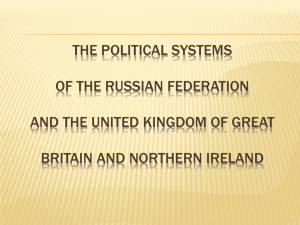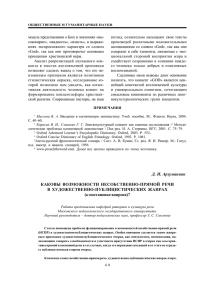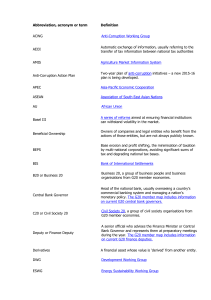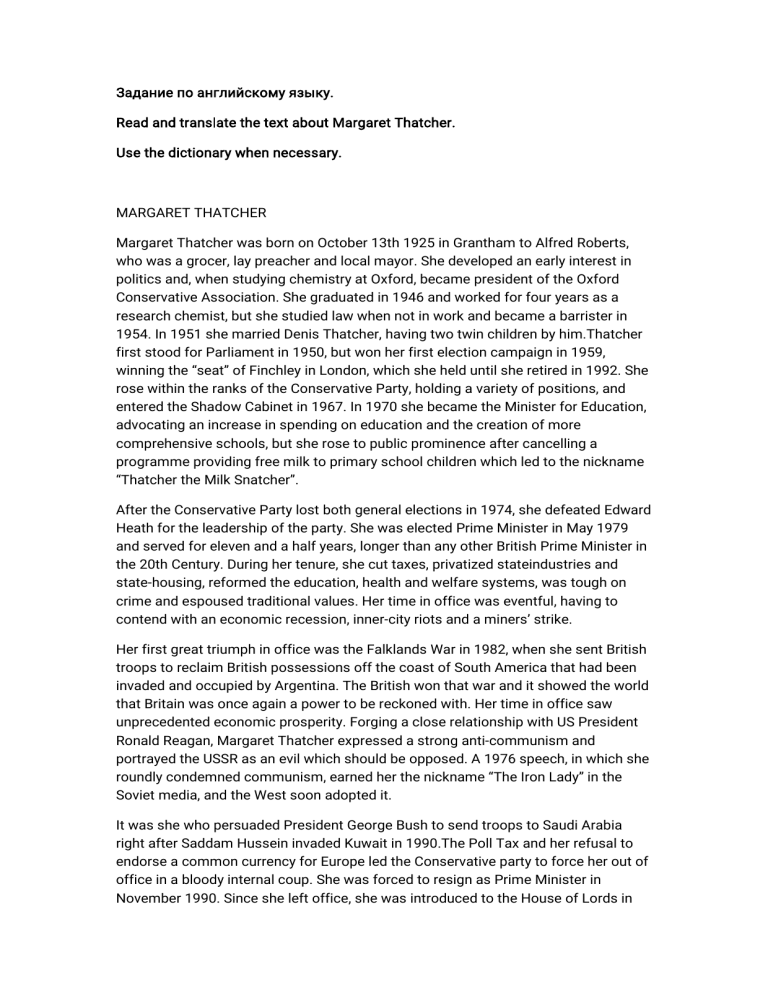
Задание по английскому языку. Read and translate the text about Margaret Thatcher. Use the dictionary when necessary. MARGARET THATCHER Margaret Thatcher was born on October 13th 1925 in Grantham to Alfred Roberts, who was a grocer, lay preacher and local mayor. She developed an early interest in politics and, when studying chemistry at Oxford, became president of the Oxford Conservative Association. She graduated in 1946 and worked for four years as a research chemist, but she studied law when not in work and became a barrister in 1954. In 1951 she married Denis Thatcher, having two twin children by him.Thatcher first stood for Parliament in 1950, but won her first election campaign in 1959, winning the “seat” of Finchley in London, which she held until she retired in 1992. She rose within the ranks of the Conservative Party, holding a variety of positions, and entered the Shadow Cabinet in 1967. In 1970 she became the Minister for Education, advocating an increase in spending on education and the creation of more comprehensive schools, but she rose to public prominence after cancelling a programme providing free milk to primary school children which led to the nickname “Thatcher the Milk Snatcher”. After the Conservative Party lost both general elections in 1974, she defeated Edward Heath for the leadership of the party. She was elected Prime Minister in May 1979 and served for eleven and a half years, longer than any other British Prime Minister in the 20th Century. During her tenure, she cut taxes, privatized stateindustries and state-housing, reformed the education, health and welfare systems, was tough on crime and espoused traditional values. Her time in office was eventful, having to contend with an economic recession, inner-city riots and a miners’ strike. Her first great triumph in office was the Falklands War in 1982, when she sent British troops to reclaim British possessions off the coast of South America that had been invaded and occupied by Argentina. The British won that war and it showed the world that Britain was once again a power to be reckoned with. Her time in office saw unprecedented economic prosperity. Forging a close relationship with US President Ronald Reagan, Margaret Thatcher expressed a strong anti-communism and portrayed the USSR as an evil which should be opposed. A 1976 speech, in which she roundly condemned communism, earned her the nickname “The Iron Lady” in the Soviet media, and the West soon adopted it. It was she who persuaded President George Bush to send troops to Saudi Arabia right after Saddam Hussein invaded Kuwait in 1990.The Poll Tax and her refusal to endorse a common currency for Europe led the Conservative party to force her out of office in a bloody internal coup. She was forced to resign as Prime Minister in November 1990. Since she left office, she was introduced to the House of Lords in 1992 as Baroness Thatcher. Following several years of poor health, Thatcher died on the morning of 8 April 2013 at The Ritz Hotel in London after suffering a stroke. She had been staying at a suite in the hotel since December 2012 after having difficulty with stairs at her Chester Square home. Reactions to the news of Thatcher’s death were mixed, ranging from tributes lauding her as Britain’s greatest-ever peacetime Prime Minister to public celebrations and expressions of personalised vitriol. Details of her funeral were agreed with her in advance. In line with her wishes she received a ceremonial funeral, including full military honours, with a church service at St Paul’s Cathedral on 17 April 2013. Queen Elizabeth and Prince Philip attended the funeral, the second time in the Queen’s reign that she had attended the funeral of a former prime minister. Exercise 1. Match each definition with the correct word. Translate the words into Russian and learn them by heart. 1. to graduate a) to give someone something that they need; 2. election b) ability to control people and events; 3. to retire c) to complete a first university degree successfully; 4. power d) an occasion when you show your admiration of someone or something; 5. prosperity e) a time when people vote in order to choose someone for a political or official job; 6. a relationship f) the situation of being successful and having a lot of money; 7. a celebration g) a (usually religious) ceremony of burying or burning the body of a dead person; 8. a funeral h) the way in which two things or people are connected; 9. to provide i) something that happens, especially something that involves several people; 10. an event j) to leave your job or stop working because of old age or ill health. Exercise 2. Choose the right answer. 1. When was Margaret Thatcher born? a) in 1925; b) in 1954; c) in 1946 d) in 1951. 2. What did Margaret Thatcher work as after graduation? a) a barrister; b) a research chemist; c) a lawyer; d) the president of the Oxford Conservative association. 3. When did she win her first election company? a) in 1967; b) in 1970; c) in 1950; d) in 1959. 4. What position did she hold in 1970? a) Minister of Education; b) President of the Oxford Conservative Association; c) Prime Minister; d) Conservative Party member. 5. What was the most memorable decree of Thatcher as a Minister of Education? a) creation of more comprehensive schools; b) an increase in spending on education; c) cancelling a programme providing free milk to primary school children; d) reforms of the education system. 6. When did Margaret become a Prime Minister? a) in 1970; b) in 1974; c) in 1979; d) in 1982. 7. What event showed that Britain had a power? a) the victory in the Falklands war; b) a speech in which Margaret condemned communism; c) the Poll tax and Margaret’s refusal to endorse a common currency for Europe; d) reforms in the education, health and welfare system. 8. Why was Margaret forced out of office? a) she had close relationship with US president; b) she persuaded George Bush to send troops to Saudi Arabia; c) she expressed a strong anti-communism; d) she refused to endorse a common currency for Europe. 9. Why was she called “The Iron Lady”? a) because of a speech in which Margaret condemned communism; b) she cut taxes and reformed the education and health system; c) she cancelled a programme providing free milk to primary school children; d) she persuaded George Bush to send troops to Saudi Arabia. 10. When did Margaret Thatcher die? a) in 2012; b) in 2013; c) in 1990; d) in 1992.
